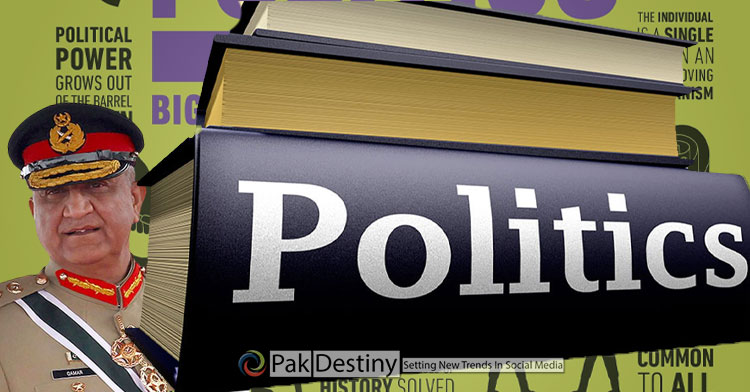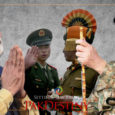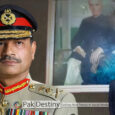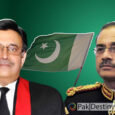
By Irum Saleem
It is a game of perception. And the military establishment losing in this front.
Dawn’s Arifa Noor put it aptly.
She said Gen Qamar Bajwa was rather busy during his six-year tenure and didn’t get much time to air his views. After all, army chiefs do not give interviews or interact with journalists the way politicians do. Now, after retiring, he seems to have time to spare; not just to talk, but also for chance encounters with journalists — some imagined, some real.
“So much has been said and so much denied that it is easier to apologise in advance for commenting here on any particular incident which has been or may be denied in the future. But, for a moment, if we assume the journalists were not simply dreaming of speaking to a retired general the way men fantasise about chatting with Deepika Padukone, then it is interesting to note what he was asked about and what he wants to speak on.”
She further writes saying
it seems there was little in our recent army chief’s military career which was related to professional matters. It is an intriguing thought that, for a military which has fought a hard war against militancy for over a decade, none of us have any questions about it and nor do the generals have much to say.
Is it because some of us were so removed from the battle scene that we know little about it? Or because the more high-profile uniformed ones are generally known more for the shadow they cast on the political realm than the battleground they may have fought on? General B is not the only one; if I ever got the chance to talk to any of the key military officers who are serving or have served, I, too, would like to ask questions of the siyasi kind.
“Be that as it may, let’s return to General B, who is in the mood to talk — it seems he feels he owes his side of the story to the people and he owes it now. He doesn’t want to wait and, say, write a book. He wants to tell his story, and it is a story in which he carries little blame.
If even the military men didn’t know the full picture, who really did?
The earlier accounts — a more neutral word than interview — aim to tell the story of a well-intentioned man who brought a new party to power because he thought it would be good for the country; but then was disappointed in his choice and dumped it faster than DiCaprio dumps his girlfriends.
In this account, Imran Khan is simply incapable of ruling — for reasons ranging from his choice of people, to the corruption of those around him, to his blunders on the diplomatic front.
But it can also be read as a mea culpa — of the management of the political system by the country’s most powerful institution. It manages politicians — from their appearances in courts, to their imprisonments and their bails, to their alliances. And through these politicians, all else gets controlled.”
General B gave an NRO, saving Khan from disqualification, though not Jahangir Tareen. Khan wanted the PDM broken, so Faiz offered relief to Asif Ali Zardari in his court cases and the deed was done. MQM wanted to leave the PTI government and it sought the permission of General B and he nodded.
When Khan offended a foreign government, the damage control was done not by the government or the Foreign Office (FO) but the chief. Eventually, Khan was sent outside the classroom. (The general was left with no choice, but the silly people on Twitter don’t get it.)
The question is not why the politicians don’t stand up, but why so much power should lie with the other side.
Ms Noor says here came the second set of revelations, which was denied faster than the imposition of Section 144 in a Pakistani city. In this account, the story was of a good man kept out of the loop on so much. For instance, General B didn’t realise Hamza Shehbaz was going to be Punjab chief minister till he was elected, which is when he told off the prime minister! This was confusing because Hamza was the possible candidate for all those days the battle of Punjab was being fought.
The poor man got the vote twice — first in a hotel, and then the assembly; our former chief, in charge of all that is political, defence-related and foreign, didn’t find out till after it was over.
It seems the men under him were running around, doing all kinds of illegal stuff and he never really told them off, like he did Shehbaz Sharif for nepotism. These men got journalists thrown out of jobs, forcibly entered politicians’ rooms, and the Big B could only clean up the mess later.
For some odd reason, these interviews reminded me of an incident a few years ago, when a retired military officer claimed the Jinnahpur map recovered from the MQM offices was the #fakenews of the 1990s. It began a new heated debate on channels, with retired men arguing furiously over what happened.
Was there a map or not; till, eventually, one of them said there were wheels within wheels. Watching this exchange, I was stunned: if even the military men didn’t know the full picture because of the wheels within, who really did? Yeh toh hum jaisee hee niklay (‘they’ve turned out to be like us’).
All these revelations, then and now, tarnish little by little the image of the security establishment as a well-oiled machine, where every cog works in sync with the other. After all, this perception of an efficient machine is what creates the preference for it over noisy, disorganised politicians. For long periods, the choice for us was not between parties, but parties and the other option.
“The past few years, in which the institution seems to be full of men going their own sweet way, and where decisions are abruptly made and changed, will have a far more far-reaching effect than anyone realises. Be it the fear or sense of superiority which institutions or people wield, it is dependent on perceptions just as much as hard power. If the first weakens, the second is harder to sustain”.
Will the army ever learn from its mistakes of indulging in politics? A million dollar question is not it?
PAK DESTINY






